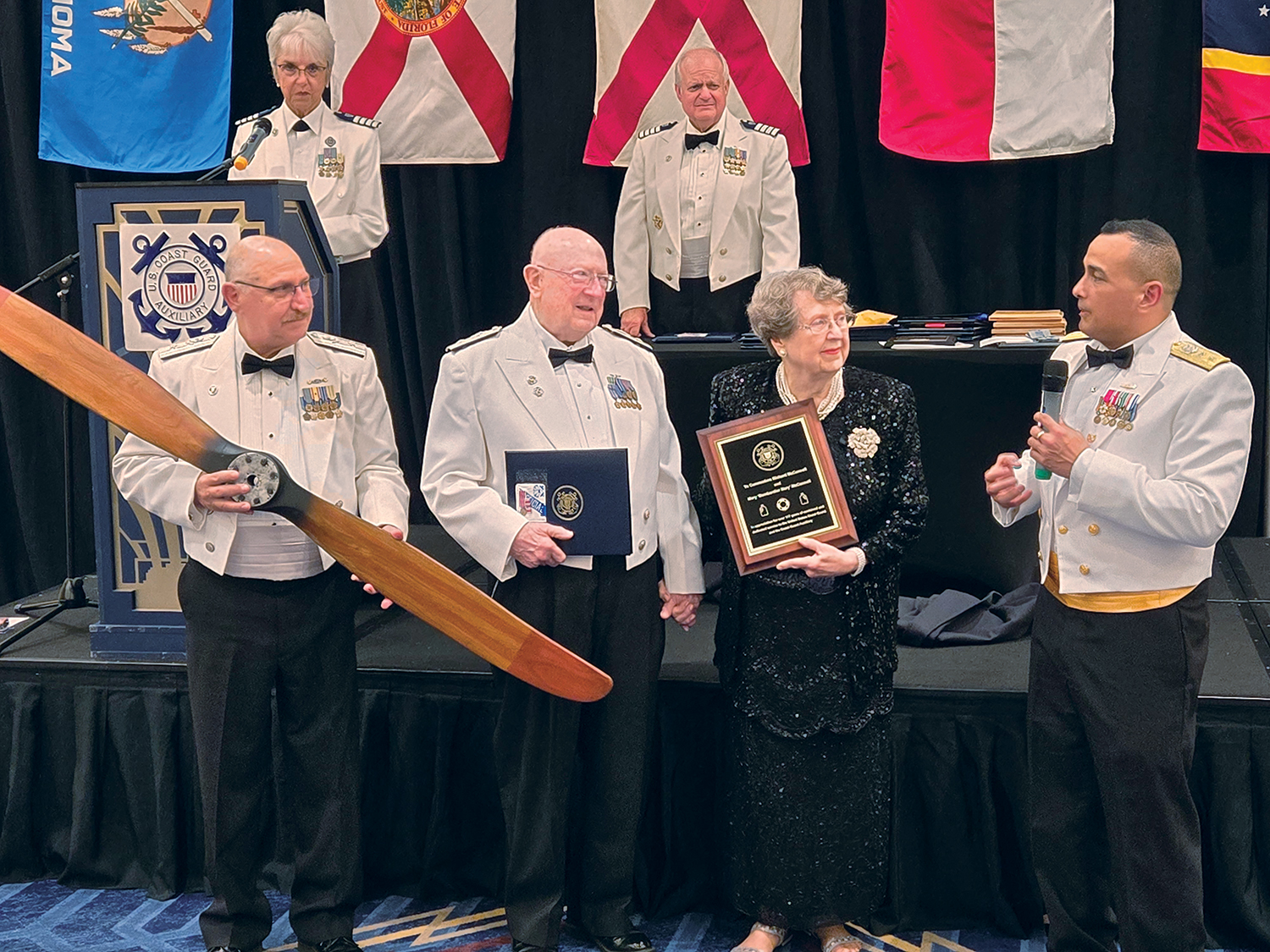Commodore Richard B. McConnell Jr. was awarded the Coast Guard Auxiliary Meritorious Service Award by Rear Adm. David Barata, commander of the Eighth Coast Guard District, at the D-Train Commodore’s Banquet on August 24 at the World War II Museum’s Higgins Hotel in New Orleans.
The award specifically addressed his recent success as he “was instrumental in creating a national policy in which retiring active duty Coast Guard members could maintain their earned qualifications in the auxiliary. This allowed members to become an immediate force multiplier in the organization, providing national impact that will significantly increase the readiness and capabilities of the Coast Guard Auxiliary,” the award said.
Prior to this policy change, members of the Coast Guard who joined the volunteer auxiliary after retirement were required to undergo auxiliary-based training for re-qualifications in areas such as boat crew and coxswain, despite having qualifications and years of experience performing those duties while on active duty.
With 60 years of service in the Coast Guard Auxiliary, McConnell received the award alongside his wife, Mary, who has 57 years of auxiliary service.
McConnell attends weekly staff meetings of Sector New Orleans as the area sector coordinator for the Coast Guard Auxiliary.
He joined the auxiliary in 1964 and was the third auxiliarist in the Eighth District to achieve AUXOP (auxiliary operational) status. In 1969, he graduated from the Air Force/Coast Guard Search and Rescue School in Governor’s Island, N.Y. In 1978, he was elected commodore of the Eighth District and was the youngest auxiliarist in the nation to hold that rank. He then served 10 years on the national staff, first as branch chief and then as division chief for aviation operations. He became an operational pilot in 1971, and his wife served as his crew.
In his 26 years flying for the Coast Guard as an auxiliarist, McConnell recorded 4,974 hours as pilot in command on Coast Guard missions and participated in 1,383 search and rescue missions. The McConnells are credited with saving 59 lives, assisting 3,526 others and preserving an estimated $285.5 million in property.
In one mission, a vessel in distress did not have a working VHF radio to communicate with the McConnells in their Cessna 180 aircraft. Improvising, Mary McConnell wrote yes/no questions and directions to respond for the people on the distressed boat. She placed the note in a half-gallon milk jug, which was painted orange. She then dropped the milk jug out of the airplane window, down to the distressed vessel. As the airplane made repeated passes overhead, the crew of the distressed vessel would communicate using the body signals detailed in the dropped message.
In 1979, the Coast Guard commandant at the time designated McConnell as a “Lifetime Member” of the auxiliary. At that time, the Coast Guard sent McConnell to the University of Southern California, where he completed the Aviation Safety Program Management course.
McConnell has flown practically every Coast Guard operational mission area, including search and rescue, pollution response, aids to navigation, marine safety, logistics and law enforcement. He earned the outstanding auxiliarist in field operations award in six different years, and in 1989 he received the U.S. Coast Guard Distinguished Public Service award, the highest non-lifesaving award an auxiliarist can receive from the Coast Guard.
————
Photo caption: Rear Adm. David Barata (right), commander of the Eighth Coast Guard District, presents service awards to Coast Guard Auxiliary Commodore Richard McConnell Jr. and Mary McConnell at the district conference August 24 in New Orleans. Standing to the left is Auxiliary Commodore Pete Scamardo. Standing above are Vice Commodore Donna Day and District Captain Morrie Bishop. (Photo by Richard Eberhardt)




